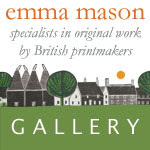Makers often contrast themselves against the corporate system. Believing the one off and small batch production work is inherently more green, than producing millions of products in far-away places, then shipping them round the world, up the motorway to shops in town centres throughout the UK.
But really how green is art and craft?
Defenders of corporate mass production claim that it is the most efficient way of manufacturing products. In an ideal world companies get a great designer to perfect their product, they work out the best and most efficient form of producing it in bulk using minimum materials and energy, test it to distraction and therefore deliver to the consumer well priced and designed products which make efficient use of energy and materials.
I think that there is a lot to be said for that argument - in some areas - for instance new cars are cheaper in real terms than ever before whilst they don't seem to break down either. The argument would probably work in green terms if people bought well but rarely, but you only have to go round a car-boot sale, to realise the sheer bulk of stuff people buy, most shipped across the world and most badly designed, and made in poor materials. In a country where people are living in smaller and smaller spaces they seem to be buying more and more, and most of it of poor quality.
Meanwhile makers produce in small quantity often using labourious processes to make often less 'perfect' looking goods. It seems to me that although mass production is probably more efficient, it is it's very efficiency that is causing the problem (environment, energy use, resource use etc and consumerist angst). In the same way that 'farming efficiencies' has pushed down the cost of food, price has become until very recently the primary benchmark, so in order to cut costs quality, flavour, and animal welfare has suffered.
I heard recently a chef called in to 'design a sausage', having to pick sage from the factory decorative flowerbed and borrow salt from the works canteen tables because simple natural ingredients just weren't stocked in the research kitchens just cheap 'flavourings'. This has meant that generally we value food less and end up buying more and more and ever cheaper food of lesser and lesser quality and flavour.
In the same way mass-production in some other sectors has developed such that price is the main benchmark. A certain Swedish furniture manufacturer has made modern design very affordable, but price has again become the major decider. The only trouble is that whilst inexpensive, chipboard isn't the strongest material in the world, veneers chip off and furniture has become a disposable item - either by choice, its so cheap that furniture can be disposed of to match the decor rather than the other way round, or just because the materials are so fragile that they don't survive moving house.
In the same way that food guru's encourage the meateaters amongst us to buy less meat but better - free-range, organic, local - then I think the answer is for us all to surround ourselves with items that we love and will last. Also to 'ground' our houses and lives by buying well and surround ourselves with what is meaningful to us - commissioning a local craftsman not only means that you get exactly what you want but it means that money is kept in the local economy and because you are involved in the commissioning process you feel an additional commitment and involvement with the piece - the contents of the house become an evolving document.
I now grow my own vegetables, buy organic veg boxes and shop at farmers markets. I confess that I can't really tell the difference in flavour between fresh veg from Waitrose or fresh veg from the garden (well maybe a little). But psycologically it feels a more grounded way of buying/eating, - we know where the food is produced, they don't have to be transported across continents and the farmer is paid a proper price rather than the middle man or retailer taking the profit, and the veg are grown with the minimum of inputs and additives.
So although mass production is probably a more efficient use of resources - even with transporting goods halfway across the world, it is the philosophy of the handmade, bespoke, one-off which can help to turn around the price led craziness of the consumerist binge we have been in for decades. We should be buying better and following William Morris' dictum. 'Have nothing in your house that you don't know to be useful or believe to be beautiful'
This post is meant to be a first attempt at rehersing arguments about why we feel that craft is important. I would very much value your contributions about how craft and design can tackle green issues in a practical way, and perhaps whether makers can contribute philosophically to a more sustainable and contented society.
Monday, 4 August 2008
How Green is Craft?
Posted by
Jon
at
20:40
![]()
Subscribe to:
Post Comments (Atom)







1 comment:
Jon - The problem is, though, that too many makers add a massive pricetag and this will always be a factor in why people shop at Ikea rather than locally. And too often - craft-made items aren't as 'fit for purpose' as mass-produced items either.
I think there's an interesting area where makers are really engaging with the green agenda; Ptolemy Elrington and his found hubcaps, the magnificent 'One Tree' project or on a more humble scale, my own work using recycled papers and found skateboards. Real Green crafts!
Dan Thompson
Post a Comment